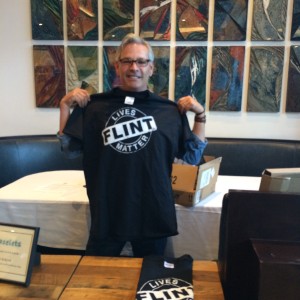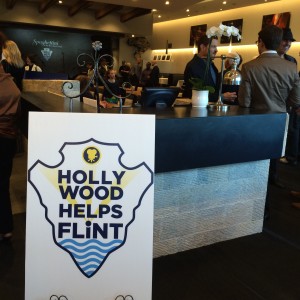By Jan Worth-Nelson
About 200 people, half of them declaring they were from Flint, came together Sunday afternoon at Spaghettini’s in Beverly Hills, California, to raise money for Flint in the wake of its water disaster. By the end of the evening, which featured performances by country singer Ty Herndon and Flint native and jazz star DeeDee Bridgewater, more than $31,000 had been donated for flintkids.org.
Contacted two days later, event organizer and LA publicist Howard Bragman, a Flint native, said the amount raised had topped $33,000 with more trickling in.
Bridgewater said because of her childhood memories of the Flint River, she was shocked by the State of Michigan’s decision to switch from Lake Huron water to the Flint River in 2014.
“Certainly we were aware the Flint River was always polluted,” she said, noting the history of waste dumped into the waterway from tanneries and on to the General Motors years.
“I knew as a kid we couldn’t swim in the river,” she said,. “I knew if we fished we had to throw the fish back.”
So when she heard that the State of Michigan — the governor and the “special people” he brought in to Flint — had decided to switch to Flint River water, she concluded, “that has to be one of the most criminal acts that I know.”
“And that nothing has happened to the politicians for me is absurd,” she said, drawing loud audience applause. “The next thing we need to do is start speaking out and voicing our discontent.”
The event was coordinated by Bragman, manager Tulani Bridgewater and producer Alex Grossman, all Flint expatriates. Dozens of Flint-style coneys — Koegel’s hot dogs, Angelo’s Coney Sauce, mustard and onions — disappeared from tray after tray at the deli table. Guests also pulled cans of Vernor’s ginger ale, the Flint-local favorite, from ice-filled tubs.
Bragman said guests gobbled up between 150 and 200 coneys and consumed about six cases of Vernor’s.
Bridgewater performed, along with country star Ty Herndon. Gordon Young, author of Teardown: Memoir of a Vanishing City, autographed books and talked about the crisis with fans and concerned expatriates.
Bragman said one huge goal of the event, in addition to raising money, was “to send love to Flint — to let them know they are in our hearts every day.”
“Whatever I am, whatever I have done today is in large part due to my upbringing in Flint,” Bragman told the crowd. “I may not live in Flint, but Flint has never left me.”
Water experts in Flint have contended the Flint River is not the problem, noting that the river’s water quality has improved dramatically since the pullouts over recent decades of the city’s chief industrial polluters. However, they point out that river water is by nature more corrosive than lake water and that the addition of anti-corrosive chemicals that cost about $100 a day would have prevented the influx of lead into the city’s drinking water. Instead, they explain, the more corrosive water loosed particles of lead from the Rust Belt city’s aging pipes.
Contentious efforts are underway to fix the problem. The city has switched back to Detroit water, but the pipes already have been damaged and residents have been sent into an orgy of testing and retesting their water, installing filters and getting blood tests.
The city’s new mayor, Karen Weaver, has locked horns with the state’s governor, Rick Snyder, over the who, what, when and how of responses to the crises; both the city and the state have response teams at work, and Weaver’s latest headline announced she opposes a no-bid contract signed recently between the state and a Flint engineering firm to move toward a long-term fix. Weaver asserts the “no bid” aspect of the decision was unacceptable, especially considering that the firm in question was a consultant in the State’s decision to move to Flint River water.

Guitarist Eric Halbig tastes his first Flint coney. Trays of the Flint staple emptied as soon as they were delivered.

Flint expatriate Mike McManaman holds up his coney as Ted Nelson, CEO of Hollywood Awards and spouse of Jan Worth-Nelson, looks on. McManaman recognized Worth-Nelson from a long ago ENG 111 class at UM-Flint. He claims she gave him an A. He went on to get a master’s degree and a career as a software consultant.

Gordon Young, San Francisco journalist and author of Teardown: Memoir of a Vanishing City, made the scene. He said, with some ambivalence, the water crisis has drawn attention to his 2013 book, a personal account of looking for a house to buy in his hometown.

Jazz great and Flint native DeeDee Bridgewater addresses the crowd before performing two sets.

Publicist Howard Bragman (left) organized the benefit and here sells his jewelry with his husband, Chuck O’Donnell. Making the bracelets is “occupational therapy for me,” Bragman said.

At its peak more than 200 packed into Spaghettini, more than half at one point raucously declaring they were from Flint.

Flint native DeeDee Bridgewater on the stage at Spaghettini. Restaurant manager Dave Koz donated the room to the Flint benefit, Bragman said.

Chuck O’Donnell said these teeshirts went fast.



You must be logged in to post a comment.